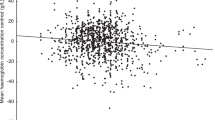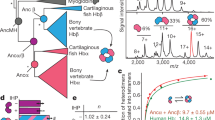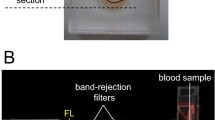Abstract
IT is well known that the affinity of haemoglobin for oxygen varies according to the conditions in which the measurements are made1.
This is a preview of subscription content, access via your institution
Access options
Subscribe to this journal
Receive 51 print issues and online access
$199.00 per year
only $3.90 per issue
Buy this article
- Purchase on Springer Link
- Instant access to full article PDF
Prices may be subject to local taxes which are calculated during checkout
Similar content being viewed by others
References
Antonini, E., Interrelationship between Structure and Function in Haemoglobin and myog. in Physiol. Rev., 45, No. 1 (1965).
Leggio, T., and Morpurgo, G., Ann. 1st. Super. Sanità (in the press).
Rossi-Fanelli, A., and Antonini, E., Nature, 186, 895 (1960).
Kaiser, Ch., The Physiology of Hibernation (Pergamon Press, 1961).
Eisentraut, M., Z. Morph. Ökol. Tiere, 29, 231 (1934).
Eisentraut, M., Der Winterschlaf mit seinen ökologischen und Physiologischen Begleiterscheinungen (Fischer Verlag, Jena, 1956).
Author information
Authors and Affiliations
Rights and permissions
About this article
Cite this article
LEGGIO, T., MORPURGO, G. Dissociation Curves of Toad Haemoglobin and a Hypothesis for the Cause of Hibernation. Nature 219, 493–494 (1968). https://doi.org/10.1038/219493a0
Received:
Issue Date:
DOI: https://doi.org/10.1038/219493a0
This article is cited by
-
Anaerobiosis and the oxygen debt in an anuran amphibian,Rana esculenta (L.)
Journal of Comparative Physiology (1972)
Comments
By submitting a comment you agree to abide by our Terms and Community Guidelines. If you find something abusive or that does not comply with our terms or guidelines please flag it as inappropriate.



